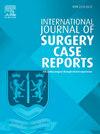复杂的梅克尔憩室隐藏在巨大的粘液性卵巢癌-手术隧道视力的警示故事1例报告
IF 0.6
Q4 SURGERY
引用次数: 0
摘要
在临床环境中,认知偏差,特别是隧道视觉,容易导致被称为“从未发生过的事件”的灾难性结果。病例介绍一名58岁女性,以慢性腹胀腹痛为主。影像学显示一巨大卵巢病变,推测为继发于肿块效应的小肠梗阻。她接受了手术切除和分期检查。除了26.5公斤的黏液性卵巢腺癌(MOC)外,术中发现患者有梅克尔憩室(MD),伴肠近端粘连(这是SBO的真正诱发因素),并有肠穿孔,需要进行肠切除术并重新吻合。术后恢复良好,无复发。与术前诊断困难的Meckel憩室相反,大量MOC是一种分散的同步病理,易导致隧道视力。手术隧道视力增加了never事件的风险。为了提高对认知偏差的认识,已经提出了各种系统的去偏策略,但仍需要进一步的研究来调查这些策略的长期临床效益。结论临床医生可以很容易地采用消除偏见的技术来提高对无意识偏见的认识,特别是在明显的临床表现下,对视觉隧道的自然倾向。然而,需要进一步的研究来探索在围手术期实施降压技术的好处。本文章由计算机程序翻译,如有差异,请以英文原文为准。
Complicated Meckel's diverticulum concealed by massive mucinous ovarian carcinoma – A case report of the cautionary tale of surgical tunnel vision
Introduction
Cognitive bias, especially tunnel vision, in the clinical setting can predispose to catastrophic outcomes termed “never events”.
Case presentation
A 58-year-old woman presented with abdominal pain on the background of chronic abdominal distension. Imaging indicated a massive ovarian lesion with presumed small bowel obstruction (SBO) secondary to mass effect. She underwent resection and staging workup. In addition to the 26.5 kg mucinous ovarian adenocarcinoma (MOC), she was intraoperatively found to have a Meckel's diverticulum (MD) with a band adhesion to proximal bowel (as the true precipitant of her SBO) and a contained enteric perforation, necessitating bowel resection and re-anastomosis. She made an excellent postoperative recovery and remains recurrence-free.
Clinical discussion
In contrast to Meckel's diverticula which pose a preoperative diagnostic challenge, the massive MOC represented a distracting synchronous pathology which predisposed to tunnel vision. Surgical tunnel vision increases the risk of never events. A variety of systematic debiasing strategies have been proposed to raise awareness of cognitive bias but further research is still necessary to investigate the long-term clinical benefit of these strategies.
Conclusion
Clinicians can readily incorporate debiasing techniques to raise awareness of unconscious biases, particularly the natural tendency to tunnel vision with glaring clinical findings. However, further study is required to explore the benefits of implementing debiasing techniques in the perioperative setting.
求助全文
通过发布文献求助,成功后即可免费获取论文全文。
去求助
来源期刊
CiteScore
1.10
自引率
0.00%
发文量
1116
审稿时长
46 days

 求助内容:
求助内容: 应助结果提醒方式:
应助结果提醒方式:


